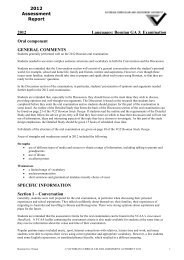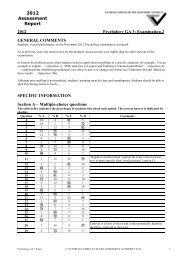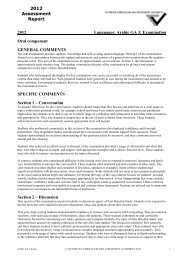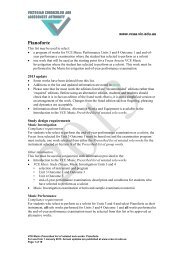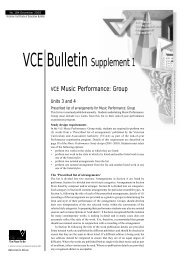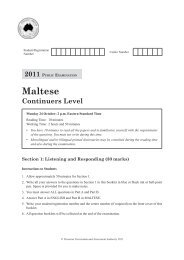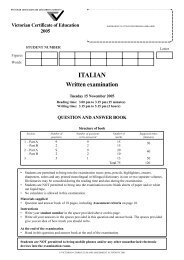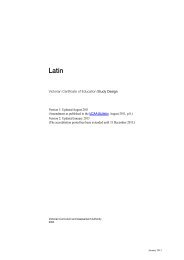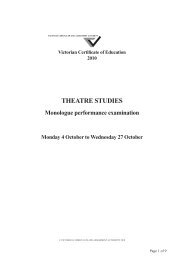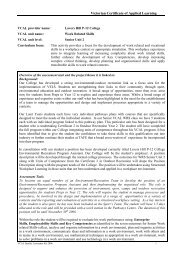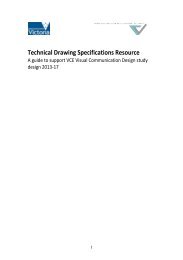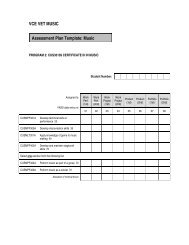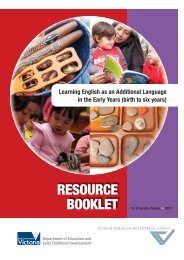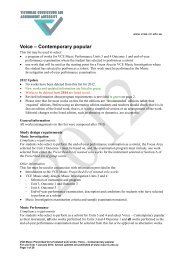television, digital media and children's learning - Victorian ...
television, digital media and children's learning - Victorian ...
television, digital media and children's learning - Victorian ...
Create successful ePaper yourself
Turn your PDF publications into a flip-book with our unique Google optimized e-Paper software.
Educators should encourage the use of appropriate <strong>media</strong> to take advantage of the rapid<br />
<strong>learning</strong> curve from age three.<br />
Parents need to be involved in the selection of games <strong>and</strong> in playing with their children as<br />
described in the Prensky case above. Games for unsupervised solo play should initially<br />
consist of simple image <strong>and</strong> sound exercises focused more on developing symbolism than<br />
winning or losing. Vocabulary is also of prime importance since the brain is ready to absorb<br />
new words.<br />
Adults need to spend time with children to teach them how to use the internet effectively to<br />
communicate, to find information <strong>and</strong> to be entertained. They need especially to help children<br />
develop a framework <strong>and</strong> strategies for internet use that will ensure their safety <strong>and</strong> wellbeing.<br />
In order to do this, adults themselves need to:<br />
• know how to locate TV channels, pre-record programs, set up videos <strong>and</strong> DVDs<br />
• know how to use a computer to use the internet as an effective research tool <strong>and</strong> sift for<br />
accuracy <strong>and</strong> bias; send emails <strong>and</strong> photos <strong>and</strong> download tools to create content; use<br />
communication technologies with appropriate ‘netiquette’ <strong>and</strong> safe practices, including<br />
strategies for dealing with inappropriate <strong>and</strong> unwanted material<br />
• play h<strong>and</strong>-held <strong>and</strong> computer-based games<br />
• know who produces various kinds of programs <strong>and</strong> the purposes behind programming<br />
• know how programs are produced, identify hidden messages <strong>and</strong> assess commercial<br />
messaging<br />
• differentiate reportage from advocacy<br />
• identify creative possibilities<br />
• be active <strong>media</strong> users, not passive recipients of unsuitable material aimed at the child as a<br />
consumer<br />
• participate <strong>and</strong> interact with children in all <strong>media</strong>-technology experiences by watching <strong>and</strong><br />
discussing TV programs <strong>and</strong> playing computer games<br />
• perceive <strong>media</strong> technology as powerful <strong>learning</strong> mechanisms for children with negative<br />
<strong>and</strong> positive potential<br />
• underst<strong>and</strong> that without an ability to use the new technology, children’s <strong>learning</strong> <strong>and</strong><br />
development will be seriously disadvantaged impacting on their scholastic capacity <strong>and</strong><br />
work prospects<br />
• accept that the old days of chalk <strong>and</strong> talk teaching are gone<br />
• appreciate that children have a new <strong>learning</strong> power through technology but they have to<br />
be taught how to use the computer <strong>and</strong> other <strong>media</strong> to their greatest advantage<br />
• undertake teacher training to provide students with support to direct their boundless<br />
creativity through new <strong>media</strong><br />
• become parental activists, dem<strong>and</strong>ing better quality <strong>media</strong> programs designed specifically<br />
for Australian children, protesting about their commercial exploitation, dem<strong>and</strong>ing better<br />
regulation of all <strong>media</strong>, including computer games that are designed with educational<br />
purposes <strong>and</strong> consider children’s interests.<br />
FINDING<br />
14. A systematic program in <strong>media</strong> literacy <strong>and</strong> <strong>media</strong> education should be developed <strong>and</strong><br />
made available to parents, child carers, pre-school teachers <strong>and</strong> other adults to increase<br />
their awareness of the positive potential for children to learn <strong>and</strong> develop healthily through<br />
the use of <strong>media</strong> <strong>and</strong> <strong>digital</strong> technology.<br />
The <strong>digital</strong> divide<br />
DISCUSSION<br />
21



